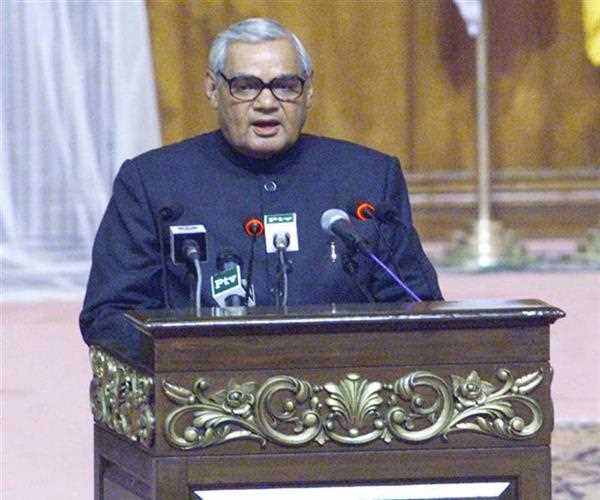Search here

02-Dec-2022
Atal Bihari Vajpayee-The Legend
Playing text to speech
It would be an understatement to say that Atal Bihari Vajpayee was one of the most respected leaders of our time. He was a man of many firsts- the first non-Congress Prime Minister to serve a full five-year term, the first to deliver a nuclear speech at the UN General Assembly, and the list goes on. But more than his politics, it was his persona that endeared him to the masses. He was a poet, an orator, and a true gentleman. In this blog post, we will explore the life and legacy of Atal Bihari Vajpayee, one of India's most loved Prime Ministers.
Early Life of Atal Bihari Vajpayee
- Atal Bihari Vajpayee was born in Gwalior on December 25, 1924. His father, Krishna Bihari Vajpayee, was a school teacher and his mother, Krishna Devi, was a homemaker. He had one sister, Vidya Bharati.
- He began his schooling at the age of eight at Saraswati Shishu Mandir and later attended Gwalior's Victoria College (now Laxmi Bai College) where he completed his graduation with distinction in Hindi, English, and Sanskrit. While studying at college, he also joined the Rashtriya Swayamsevak Sangh (RSS) as a swayamsevak (volunteer).
- In 1942, he was interned along with other RSS volunteers during the Quit India Movement. After his release from jail, he completed his LLB degree from DAV College, Kanpur, and started practicing law in Gwalior state court.
Political Career of Atal Bihari Vajpayee
- Atal Bihari Vajpayee's political career began in 1942 when he was just a college student. He became involved with the Quit India Movement and was arrested for his participation. After being released from prison, he completed his degree and then joined the Rashtriya Swayamsevak Sangh (RSS). He rose through the ranks of the RSS and eventually became a leader of the Bharatiya Jana Sangh (BJS), which was a political party affiliated with the RSS.
- In 1957, Vajpayee was elected to the Lok Sabha, the lower house of India's parliament. He quickly established himself as a talented and effective parliamentarian. In 1968, following a split in the BJS, he helped found the Bharatiya Janata Party (BJP). Vajpayee served as the BJP's president from 1968-1972.
- From 1996-1998, Vajpayee served as India's prime minister. Although his government only lasted 13 months, he is widely credited with helping to stabilize India's economy and bringing about an era of peace and prosperity. He also improved relations with Pakistan and took steps to resolve the long-standing conflict in Kashmir.
- In 1999, Vajpayee once again became prime minister. This time his government lasted for five years. During this period, he made progress on economic reform and continued to improve relations with Pakistan. In 2004, Vajpayee announced that he would retire from politics due to health
Prime Ministerial Tenure of Atal Bihari Vajpayee
Atal Bihari Vajpayee was the Prime Minister of India for three terms, each lasting for about a year. He is the only non-Congress Prime Minister to serve a full five-year term.
- Vajpayee was sworn in as the Prime Minister of India on 16 May 1996. He took office after the collapse of the previous government led by P. V. Narasimha Rao. The new government, which was a coalition government comprising several parties, lasted for 13 days before it collapsed due to a lack of support from other parties.
- Vajpayee again became the Prime Minister on 1 March 1998 after fresh elections were held following the collapse of the previous government. This time, he headed a coalition government that lasted its full term until 1999.
- After the 1999 general elections, Vajpayee led a minority government as the head of the National Democratic Alliance (NDA). The NDA won re-election in the 2004 general elections and Vajpayee remained Prime Minister until his retirement in 2004.
Later Years and Death of Atal Bihari Vajpayee
- After a long illness, Atal Bihari Vajpayee passed away on August 16, 2018, at the age of 93. He was a much-loved and respected leader, not only in India but also around the world.
- Vajpayee was born in 1924 into a middle-class family in Gwalior, Madhya Pradesh. He was a gifted student and completed his schooling with distinction. He then went on to study political science at Victoria College (now Laxmi Bai College) in Gwalior and DAV College in Kanpur. After graduation, he enrolled at Lucknow University to study law but could not complete his studies due to the outbreak of World War II.
- In 1942, Vajpayee joined the Rashtriya Swayamsevak Sangh (RSS), a right-wing Hindu nationalist organization. He quickly rose through the ranks and became one of its most prominent leaders. In 1951, he co-founded the Bharatiya Jana Sangh (BJS), the predecessor of the Bharatiya Janata Party (BJP).
- Vajpayee was first elected to parliament in 1957 as a member of the Lok Sabha, the lower house of parliament. He served as a cabinet minister in several governments between 1977 and 1989 but never held the top post. In 1996, he became prime minister for 13 days but had to resign after losing a vote of confidence by just one vote.
Legacy of Atal Bihari Vajpayee
- Atal Bihari Vajpayee was an Indian politician who served as the Prime Minister of India for three terms: first for a term of 13 days in 1996, then for a period of 11 months from 1998 to 1999, and finally, for a full term from 1999 to 2004. He was a member of the Bharatiya Janata Party (BJP) and is the only prime minister from outside the Congress party to serve a full five-year term.
- Vajpayee was born in 1924 into a middle-class Brahmin family in Gwalior state. He began his career as a journalist with Rashtradharma magazine and later became active in politics with the help of his mentor Shyama Prasad Mukherjee. He was briefly jailed during the Quit India Movement and went on to become one of the founding members of the Bharatiya Jana Sangh (BJS), which evolved into the BJP in 1980.
- Vajpayee was a prolific writer and orator, and his poetic verses were widely popular. He frequently used metaphors and similes to drive home his points, which endeared him to many Indians. His speeches were often broadcast on radio and television, and he became known as 'The Voice of India'.
- In 1977, Vajpayee led the BJS into an alliance with several other parties to form the Janata Party, which won the general election that year. He served as the Minister of External Affair

Comments
Solutions
Copyright 2010 - 2024 MindStick Software Pvt. Ltd. All Rights Reserved Privacy Policy | Terms & Conditions
